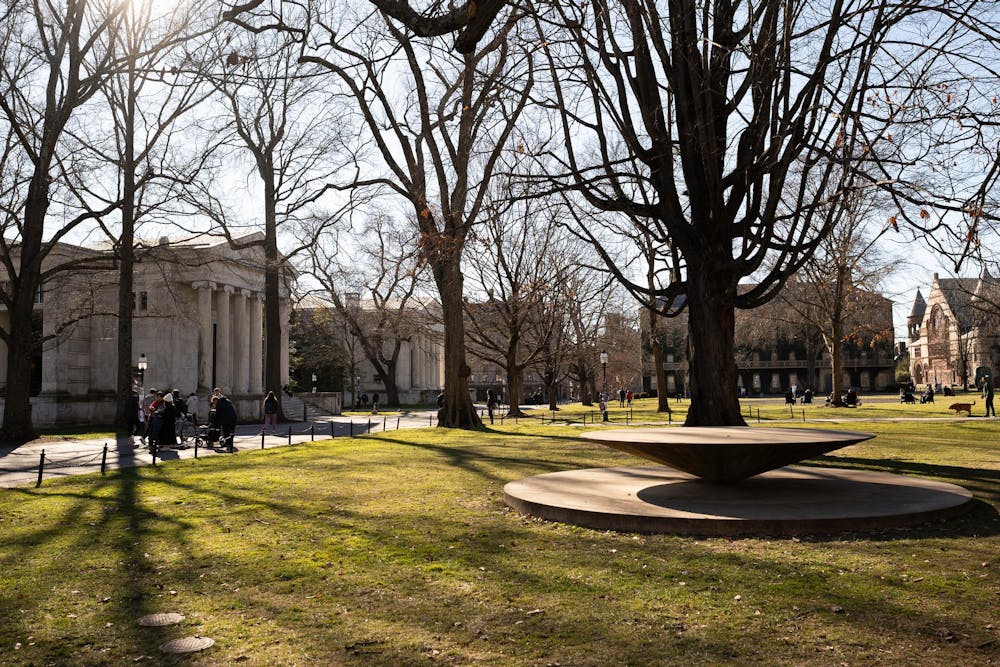The following is a guest contribution and reflects the author’s views alone. For information on how to submit a piece to the Opinion section, click here.
Dr. Lauren Wright’s July op-ed in The Atlantic — “How Liberal College Campuses Benefit Conservative Students” — has sparked a good deal of debate at Princeton and beyond.
On July 11, my friend and Columbia senior, Jonas Du, published a response in The Free Press attacking Dr. Wright’s argument. “[T]he intolerance conservative students like me are forced to endure is nothing to celebrate,” Du wrote, arguing that Dr. Wright’s conclusions rang hollow in the face of the abuse he and other student journalists experienced during Columbia’s spring anarchy. A few weeks ago, The Daily Princetonian head Opinion editor Eleanor Clemans-Cope ’26 attacked Dr. Wright’s article from the left. In the process, she also launched a broadside against campus conservatism and conservative free speech advocacy that has become all too common in the pages of the ‘Prince.’
As a former student and interviewee of Dr. Wright’s, I feel her conclusions deserve a defense. As a conservative, I believe Clemans-Cope’s article demands a response. As an advocate for free speech on campus, I believe the principles of free and open debate warrant a proper definition, not a poor caricature.
If personal experience is the currency of modern campus politics, my time at Princeton has proven Dr. Wright’s conclusions correct. I have benefited tremendously from an environment in which my views are in the minority.
After every class period or conversation, I must re-evaluate my beliefs in light of new arguments and information. Some of my best Princeton memories have been the fruits of these disagreements: Whig-Clio Senate debates, early morning arguments, and late meal discussions all come to mind. I’ve rarely come away from a conversation or debate thinking I convinced someone, but I’ve always come away with a better understanding of their beliefs. I certainly hope that they’ve gone away with a better understanding of mine.
But as Clemans-Cope describes it, such discussions and debates might not only be unnecessary — they can be threatening. If the ideas being discussed are “fringe” or “harmful,” they must be banished from the conversation. If conservatives dare challenge this framing, they are unfairly forcing progressives to engage on “their turf.” However, if by “their turf” she means the field of free debate, then I plead guilty. I am sure that many of my friends and peers, both conservative and liberal alike, would be my willing co-defendants.
Free speech is not a principle which falls neatly on one side of the political divide. Debate, the natural result of free speech properly understood, doesn’t dole out benefits based on ideology — at least it shouldn’t. It provides a forum in which divergent parties can dissect their disagreements. These disagreements may be tense, and they may invite tremendous controversy, but they are necessary if any of those beliefs are to be safe from expulsion. Sometimes called the truth-seeking justification for free speech, this approach recognizes speech as a means to pursuing capital “t” Truth, however much it may be properly ascertained. In an educational environment like the University, this approach makes a lot more sense — and provides much greater room for intellectual maneuverability — than a culture demanding ideological purity.

Clemans-Cope ultimately defines “debate” in a way that entirely excludes the ideas and subjects with which she disagrees — namely, those things which are debatable. She attempts to escape debate by defining herself and fellow campus progressives out of an intellectual challenge. The only sleight of hand is hers. If the discursive deck is stacked only with progressive ideas, conservatism is not only undesirable, it is nonexistent.
However, no matter how hard she may try, she will not — and cannot — make my perspective disappear. Painting mainstream conservative beliefs — such as opposition to abortion, support for a traditional definition of marriage, and skepticism about modern conceptions of personal identity — as “fringe” and “harmful” does nothing to erase those ideas. It only hastens the intellectual and verbal atrophy that plagues modern campuses.
Ultimately, the most important question that students should ask themselves is this: whom do I trust to decide which ideas are valid and which ones are vile? The answer to this question reveals the issue with a progressive conception of speech. However, if the right answer has already been determined, free speech does not exist. Free speech exists precisely because we do not know all of the answers, and we use our gifts of speech and reason to get closer to them. We may not reach them, but at least we can fulfill ourselves with the pursuit.
None of this is to say I believe all my positions to be intellectually superior to those with whom I disagree. On the contrary, it is precisely because I understand the limits of my own knowledge that I welcome challenges to my beliefs. I certainly find some ideas, to use Clemans-Cope’s own words, “regressive” and “fringe.” That does not mean I dismiss them as such, nor do I want them expelled from view. Rather, I try my best to understand why people believe them and advocate for them. It profits me nothing to ignore an entire set of beliefs and ideas.

Clemans-Cope’s article ultimately proves Dr. Wright’s broader point. Some students are content to avoid ideas that challenge their beliefs, choosing instead to define their way out of a potential debate. Defenders of true discursive freedom don’t react in kind. We don’t ask that progressive ideas be banished from conversation, nor do we believe conservative thought to be sacrosanct. We neither wish for dominance nor strive for submission. As long as some on the left continue to define free speech as the exclusive right to hold their preferred beliefs, conservatives will continue pushing back, embracing a conception of free speech which often invites and encourages sets of beliefs they find profoundly wrong.
Contrary to our critics, conservative students are not victims. We do not believe we are unduly persecuted, nor do we wallow in our own misery. We do, however, recognize that our ideas are not popular in many corners of the University, and we know we must work harder to define, debate, and defend our beliefs. In this regard, Professor Wright is spot on.
Zach Gardner is a Junior majoring in Politics and minoring in English. He is the managing editor of the Princeton Tory, the President of the Princeton Federalist Society, and the President of the Princeton Open Campus Coalition. He can be reached at zachgardner[at]princeton.edu.








